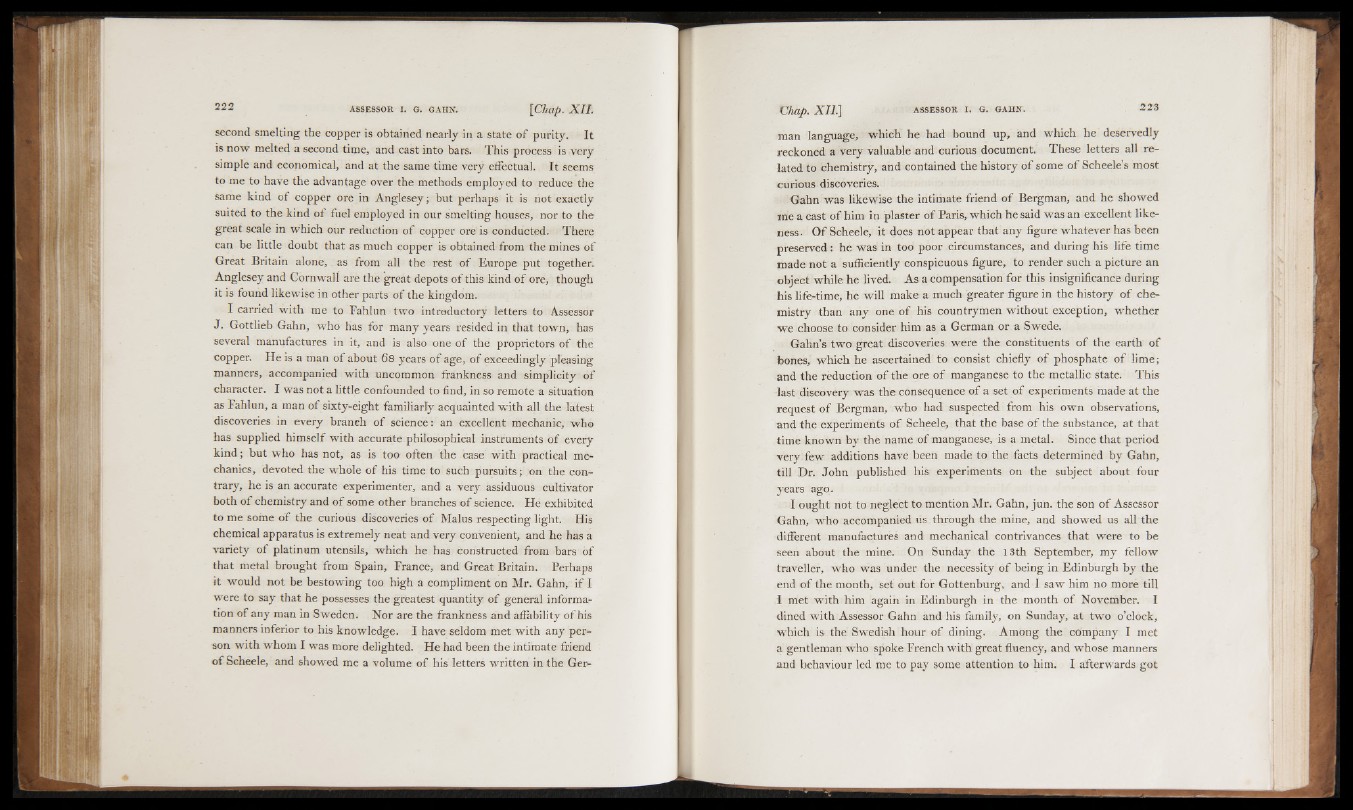
second smelting the copper is obtained nearly in a state of purity. It
is now melted a second time, and cast into bars. This process is very
simple and economical, and at the same time very effectual. It Seems
to me to have the advantage over the methods employed to reduce the
same kind of copper ore in Anglesey; but perhaps it is not exactly
suited to the kind ot fuel employed in our smelting houses, nor to the
great scale in which our reduction o f copper ore is conducted. There
can be little doubt that as much copper is obtained from the mines of
Great Britain alone, as from all the rest o f Europe put together.
Anglesey and Cornwall are the great depots of this kind of ore, though
it is found likewise in other parts of the kingdom.
I carried with me to Fahlun two introductory letters to Assessor
J. Gottlieb Gahn, who has for many years resided in that town, has
several manufactures in it, and is also one of the proprietors of the
copper. He is a man of about 68 years of age, of exceedingly pleasing
manners, accompanied with uncommon frankness and simplicity of
character. I was not a little confounded to find, in so remote a situation
as Fahlun, a man of sixty-eight familiarly acquainted with all the latest
discoveries in every branch o f science: an excellent mechanic, who
has supplied himself with accurate.philosophical instruments of every
kind; but who has not, as is too often the case with practical mechanics,
devoted the whole o f his time to such pursuits;. on the contrary,
he is an accurate experimenter, and a very assiduous cultivator
both of chemistry and of some other branches of science. He exhibited
to me some o f the curious discoveries o f Malus respecting light. His
chemical apparatus is extremely neat and very convenient, and he has a
variety o f platinum utensils, which he has constructed from bars of
that metal brought from Spain, France, and Great Britain. Perhaps
it would not be bestowing too high a compliment on Mr. Gahn, i f I
were to say that he possesses the greatest quantity o f general information
of any man in Sweden. Nor are the frankness and affability of his
manners inferior to his knowledge. I have seldom met with any person
with whom I was more delighted. He had been the intimate friend
of Scheele, and showed me a volume of his letters written in the German
language, which he had bound up, and which he deservedly
reckoned a very valuable and curious document. These letters all related
to chemistry, and contained the history o f some o f Scheele’s most
curious discoveries.
Gahn was likewise the intimate friend of Bergman, and he showed
me a cast of him in plaster of Paris, which he said was an excellent likeness.
Of Scheele, it does not appear that any figure whatever has been
preserved : he was in too poor circumstances, and during his life time
made not a sufficiently conspicuous figure, to render such a picture an
object while he lived. As a compensation for this insignificance during
his life-time, he will make a much greater figure in the histoiy of chemistry
than any one o f his countrymen without exception, whether
we choose to consider him as a German or a Swede.
Gahn’s two great discoveries were the constituents of the earth of
bones, which he ascertained to consist chiefly of phosphate o f lime;
and the reduction of the ore of manganese to the metallic state. This
last discovery was the consequence o f a set of experiments made at the
request o f Bergman, who had suspected from his own observations,
and the experiments o f Scheele, that the base o f the substance, at that
time known by thè name of manganese, is a metal. Since that period
very few* additions have been made to the facts determined by Gahn,
till Dr. John published his experiments on the subject about four
years ago.
I ought not to neglect to mention Mr. Gahn, jun. the son o f Assessor
Gahn, who accompanied us through the mine, and showed us all the
different manufactures and mechanical contrivances that were to be
seen about the mine. On Sunday the 13 th September, my fellow
traveller, who was under the necessity o f being in Edinburgh by the
end of the month, set out for Gottenburg, and I saw him no more till
I met with him again in Edinburgh in the month of November. I
dined with Assessor Gahn and his family, on Sunday, at two o’clock,
which is the Swedish hour of dining. Among the company I met
a gentleman who spoke French with great fluency, and whose manners
and behaviour led me to pay some attention to him. I afterwards got